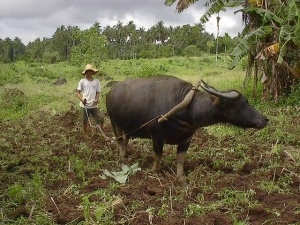
by Gilbert Sape
Pesticide Action Network Asia and the Pacific
A reaction to the article, “DENR exec pushes for genetically modified organisms in food production” posted last 20 July 2011. (Link: http://newsinfo.inquirer.net/26543/denr-exec-pushes-for-genetically-modified-organisms-in-food-production) [1] to the points raised by director Marcial Amaro, Jr. of Department of Environment and Natural Resources’ Ecosystems Research and Development Bureau (DENR-ERDB) that “biotechnology, including genetically modified organisms, could help ensure food security for the country”, genetic engineering (GE) in agriculture promoted by agribusiness corporations more than three decades ago failed its claim to solve food insecurity in the Philippines or in any developing country for that matter.
Contrary
World hunger continues to rise because corporate agriculture intensified the inaccessibility of food by the poor – genetic modification on food crops benefitted the transnational corporations (TNCs), putting the local agricultural economies at a remarkable disadvantage by monopolising the seed market through the application of intellectual property rights (IPR), and increasing the disparities between the poor and the rich. Patenting of genetic resources obviously propagates the sad truth that “whoever owns the seed, controls the food, and controls the world.”
Hunger and malnutrition exist because small food producers do not have access to productive resources such as land.
According to the ERDB national director, “The government recognized that modern biotechnology has great potential for human well-being if developed and used with adequate safety measures for the environment and human health.” He also cited in the article that “resistance to the use of GMO in food production continues, but this was due to the critics’ outright rejection of scientific studies.” He said critics have pre-conditioned their minds that GMOs were hazardous to human and environmental safety even if they did not have basis. This is outright fallacy.
Notwithstanding the existence of the Cartagena Protocol of which the Philippines is a signatory, which seeks to protect biological diversity from the potential risks posed by living modified organisms resulting from modern biotechnology, there are still reported cases of illegal GE products contaminating not only the environment but also the food that humans eat. This has already happened in 2006 when the genetically modified Liberty Link rice of Bayer CropScience, which was not meant for commercial distribution, contaminated the US rice supply and brought at least $750 Million worth of damages to the local farmers. Liberty Link rice is known to contain an herbicide that carries unacceptable risks to humans, especially the neurological development of the foetus, to agricultural biodiversity, and to the environment.
Furthermore, the International Assessment of Agricultural Knowledge, Science and Technology for Development (IAASTD) reported in 2008 that large-scale monocultures of GE crops have had a negative impact including drastically reducing natural and agricultural biodiversity. When an initiative such as biotechnology raises threats of harm to human health or the environment, it is just but moral and logical that precautionary measures be considered even if some cause and effect relationships are not fully established scientifically.
In the case of the Philippines, promotion of biotechnology in agriculture by government officials seems very ironic with the passage of the Organic Agriculture Act of 2010 (Republic Act 10068). This law was enacted to supposedly promote the practice of Organic Agriculture that will reduce pollution and destruction of the environment, prevent depletion of natural resources, and protect the health of farmers, consumers and the general public. It is but confusing that even when RA 10068 has already been promulgated and GE crops proven to negatively impact the environment, an executive of a national environmental agency still endorses genetic modification in agriculture.
According to UN Special Rapporteur on the Right to Food, Olivier De Schutter on his Report on Agroecology and the Right to Food presented to the United Nations in March 2011, “We won’t solve hunger with industrial farming on large plantations. The solution lies in supporting small-scale farmers’ knowledge and experimentation, and in raising incomes of smallholders so as to contribute to rural development.”
The Pesticide Action Network Asia and the Pacific (PAN AP) concurs that biodiversity-based ecological agriculture is not only safe to the environment and human beings; people-centred sustainable agricultural systems and access to productive resources are key to food security.
Gilbert Sape
Programme Coordinator
Food Sovereignty and Ecological Agriculture
Pesticide Action Network Asia and the Pacific
2nd Floor IBON Center
114 Timog Ave., Quezon City
1103 Philippines
Read the Full Article Here: http://www.panap.net/en/fs/post/food-sovereignty/728 [2]
